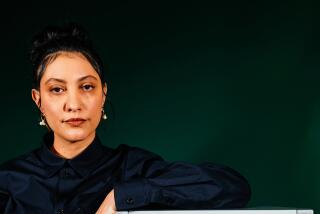The Envelope: Frances McDormand stretches as producer, star of HBO’s ‘Olive Kitteridge’
As the title character in “Olive Kitteridge,” HBO’s searing miniseries about a depressive, middle-aged Maine schoolteacher who’s short on patience but long on wit, Frances McDormand is unforgettable. But it’s a role she might not have found if she hadn’t taken the initiative. “I wanted to start generating my own work,” says the actress (“Fargo,” “Moonrise Kingdom”) who optioned the Pulitzer Prize-winning novel by Elizabeth Strout and became an executive producer on the project. “Joel and Ethan Coen were my mentors in film, and their sets are run really well and economically,” says the actress, who is married to Joel Coen. She plans to keep producing. “There’s no stopping me now — I think I’ve proven that I’m good at it.”
Being an executive producer can mean many things. What did it mean in this case?
It means I was really involved — I optioned the book, I took it to HBO, I assigned a writer — Jane Anderson — and we developed it together. I was involved in casting, choosing a crew, even things like how the Kitteridge house would look. Let me tell you, when I walked into the kitchen of that house, I started crying, it was so perfect. You could feel that it had been passed down; it was the foundation of the Kitteridge family. Not a lot changed in that house over the 25 years of our story — these were people like my parents, who kept their furniture forever because it was good quality to begin with.
How were you able to inhabit the character of Olive so persuasively?
Well, I’m 57 — that has a lot to do with it. I’ve been working as an actor for 35 years and living for 57. She’s a supporting character in other people’s lives, and that’s what I’ve been doing for 35 years — playing a supporting character to the male protagonist in movies. The brilliance of Elizabeth Strout’s novel is that over the course of these 13 linked short stories, some of which you hardly see her in, you realize it all adds up to being a novel about her.
Olive’s relationship with her son (John Gallagher Jr.) is so fraught. She’s tough on him but also really vulnerable. You’ve raised a son of your own. How did that affect your performance?
Jane and I both have sons the same age, and that was a huge part of our conversation when we made this. They’re both 20 now, but they were 15 when we met, and they hated our guts, and we were so bereft and confused about why we were in that position. I’m apprehensive about my son seeing this, because there are universal truths in it that are going to be very tender for us. I was the disciplinarian in our family, and I think I suffered the consequences of that as he rebelled.
Was there a scene in this four-hour miniseries that really stood out for you as a performer?
The last scene we shot in the Kitteridge kitchen, after Henry [Richard Jenkins, as her husband] has had his stroke and Christopher [their son] has come to visit him, and he and his mother have that terrible fight. The room was packed when we shot that. We had people in the crew standing on apple boxes. Everybody needed to see Christopher confront Olive and have Olive beg him for mercy.
I was distrustful of doing any scene that involved tears — I never wanted to compromise Olive’s emotional integrity. But that was a place where her feelings bubbled out of her, because she was so shocked by what Christopher said [“Admit it — you were a horrible mother!”]. When I see my face on film at that moment, it’s nobody I’ve ever seen before. It’s not me. There was a truth to what happened in that scene.
More to Read
From the Oscars to the Emmys.
Get the Envelope newsletter for exclusive awards season coverage, behind-the-scenes stories from the Envelope podcast and columnist Glenn Whipp’s must-read analysis.
You may occasionally receive promotional content from the Los Angeles Times.










